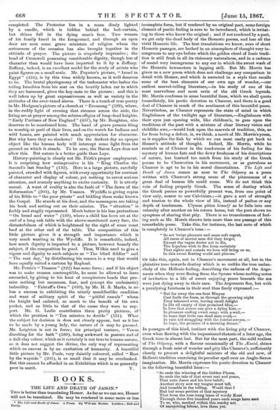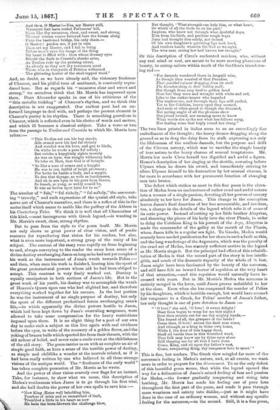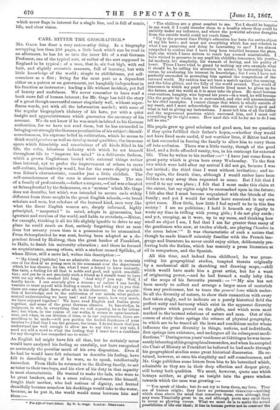B OOKS.
THE LIFE AND DEATH OF JASON.* Tens is better than translating Homer. As far as we can see, Homer will not be translated. He may be rendered in some more or less
• The Life and Death of Jason. A Poem. By Withom. Morrill. London: Ben and Addy.
incomplete form, but if rendered by an original poet, some foreign element of poetic feeling is sure to be introduced, which is irritat- ing to those who know the original ; and if not rendered by a poet, we get only the dead body of the Homeric poems, and lose all the vivid Homeric life. The best translations we know, even of short Homeric passages, are bathed in an atmosphere of thought very in- congruous to any eye before which the golden cloud of Ionic tradi- tion is still fresh in all its visionary naturalness, and in a cadence of sound very incongruous to any ear in which the sweet wash of the Homeric hexameters is lapping still. But Mr. Morris has given us a new poem which does not challenge any comparison in detail with Homer, and which is narrated in a style that recalls some of the best elements of our own age of wonder,—our earliest marvel-telling literature,—in his study of one ,of the most marvellous and most eerie of the old Greek legends. Mr. Morris confesses in some beautiful lines, which we shall quote immediately, his poetic devotion to Chaucer, and there is a good deal of Chaucer in much of the sentiment of this beautiful poem. Nevertheless, as Chaucer represents the state of mind in which Englishmen of the twilight age of literature,—Englishmen with their eyes just opening wide, like children's, to gaze upon the traditions of the past with a mixture of clear literary vision and childlike awe,—would look upon the marvels of tradition, this, so fur from being a defect, is, we think, a merit of Mr. Morris's poem, as it supplies the link by which we can most easily get back to Homer's attitude of thought. Indeed, Mr. Morris, while he reminds us of Chaucer in the tenderness of his feeling for the mystery of human fate and the dewy freshness of his descriptions of nature, has learned too much from his study of the Greek poems to be Chaucerian in his movement, or as garrulous as Chaucer is apt to be in his moral dissertations. The Life and Death of Jason comes as near to The Odyssey as a poem written with Chaucer's strong sense of the piteousness of a great deal of human life could come. We do not think this vein of feeling properly Greek. The sense of destiny which the Greek poems so powerfully present was, from one point of view only, nearer to our Calvinism ; —it gave a sort of strength and tension to the whole view of life, instead of pathos or any depth of tenderness. Ulysses pities himself as he falls into one calamity after another on bis return home, but the poet shows no symptom of sharing that pity. There is no tremulousness of feel- ing such as Mr. Morris throws into more than one passage of this remarkable poem. Take this, for instance, the last note of which is completely in Chaucer's tone : —
" So sot 'twist pleasure and some soft regret, All cares of mortal men did they forget, Except the vague desire not to die, The hopeless wish to flee from certainty That sights and sounds we love will bring on us, In this sweet fleeting world and piteous."
Or take this, again, not in Chaucer's movement at all, but in the plaintive tone towards destiny which is so unlike the iron melan- choly of the Hellenic feeling, describing the sadness of the Argo- nauts when they were fleeing from the Syrens whose melting notes of invitation to a life of sweet enjoying peace beneath the sea were just dying away in their ears. The Argonauts flee, but with a paralyzing faintness in their soul thus finely expressed :—
" But far away the sea-beat Minyae
Cast forth the foam, as through the growing night They laboured ever, having small delight
In life all empty of that promised bliss,—
In love that scarce can give a dying kiss,—
In pleasure ending sweet songs with a wail,— In fame that little can dead men avail,— In vain toil struggling with the fateful stream,—
In hope, the promise of a morning dream."
In passages of this kind, instinct with the living pity of Chaucer, even when flowing with the impassioned rhetoric of a later age, the Greek tone is almost lost. But for the most part, the mild realism of The Odyssey, with a flavour occasionally of The .tEneid, shines through a fresh mist of wonder and pity like Chaucer's, sufficiently clearly to present a delightful mixture of the old and new, of Hellenic tradition exercising its peculiar spell over an Anglo-Saxon imagination. Mr. Morris expresses his poetic devotion to Chaucer in the following beautiful lines :— " So ends the winning of the Golden Fleece, So ends the tale of that sweet rest and peace,
That unto Jason and his love befell; Another story now my tongue must tell, And tremble in the telling, Would that I Had but some portion of that mystery That from the rose-hung lanes of woody Kent
Through these five hundred years such songs have sent
To us, who, meshed within this smoky net Of =rejoicing labour, love them yet. And thou, 0 Master!—Yea, my Master still, Whatever feet have scaled Parnassus' hill,
Siueo like thy measures, clear, and sweet, and strong, Thames' stream scarce fettered bore the bream along
Unto the bastioned bridge, his only chain.- 0 Master I pardon me, if yet in vain
Thou art my Master, and I fail to bring Before men's eyes the image of the thing
My heart is filled with : thou whose dreamy eyes Beheld the flush to Cressid's cheeks arise, As 'Froilua rode up the praising street, As clearly as they saw thy townsmen meet Those who in vineyards of Poictou withstood The glittering horror of the steel-topped wood."
And, no doubt, as we have already said, the visionary freshness of Chaucer, and his pitiful tone of sentiment, is constantly repro- duced here. But as regards his " measures clear and sweet and strong,'-' we ourselves think that Mr. Morris has improved upon them. Dean Alexander speaks in one of his criticisms of the "thin metallic tinkling" of Chaucer's rhythm, and we think this description is not exaggerated. Our earliest poet had an un- formed language to deal with, and perhaps the poorest element in
Chaucer's poetry is its rhythm. There is something garrulous in
(houses, which is reflected even in his choice of words and metres, and which ill becomes a classical subject. Take a verse or two
from the passage in Troilus and Cressida to which Mr. Morris here
refers :—
"This Troilus sat eon his bay steedo, Alle armed save his bed ful richely And wended was his hors, and gan to blede, On wiche he roods a pose ful softely : But swicbe a knyghtely sights trewoly As was on hym, was nought withouten faile To loko on Mars, that God is of batayle. "So like a man of armes and a knyght He was to son, fulfild of heigh prowess° ; For bothe he hadde a body, and a myght, To don that thynge, as wele as hardynesse, And ek to sen hym in his gore hym dresse, So fressh, so yang, so weldy somed he, It was an hevon upon hym for to se."
The number of " fuls," "ful richely," "ful softely," the asseverat- ing " trewely," and such expressions of the quaint old style, take
nerve out of Chaucer's narrative, and there is a reflex of this in the metre itself which seems to amble like the palfrey of the Abbess in
his Canterbury Tales. We think it is well that all Chaucerism of this kind,—most incongruous with Greek legend,—is wanting in
Mr. Morris's sweet, clear, strong rhythm.
But to pass from the style to the poem itself. Mr. Morris not only shows us great power of clear vision, and of poetic resource for reproducing that vision for his readers, but also, what is even more important, a strong grasp of the unity of his subject. The current of the story runs rapidly on from beginning to end, always conveying to the reader the same keen sense of a divine destiny overhanging Jason so long as he had not yet completed
his work as the instrument of Jun.'s. wrath towards Pelias ;— and then, when once his work is finished, leaving him the sport of
the great preternatural powers whose aid he had been obliged to accept. This contrast is very finely worked out. Destiny is equally omnipotent in both sections of Jason's life. But in the great work of his youth, his destiny was to accomplish the wrath of Heaven's Queen upon one who had slighted her, and therefore everything worked together for his success. In the last portion he was the instrument of no single purpose of destiny, but only the sport of the different predestined forces overhanging man's life,—in which apparently the divine powers hostile to Jason, which had been kept down by Juno's overruling vengeance, were allowed to take some compensation for the heavy restrictions imposed upon them. It is no slight thing for a poet of our own day to make such a subject as this live again with real vividness before the eyes, to write of the recovery of a golden fleece, and the yoking of brazen bulls which spurted fire from their throats, with the old ardour of belief, and never raise a smile even at the childishness of the old story. The poem carries us on with as complete an air of simple good faith, as keen a sense of the terrible power of destiny, as simple and childlike a wonder at the marvels related, as if it bad been really written by one who believed in all these strange visions of the antique world. The " freshness of the early world" has taken complete possession of Mr. Morris as he wrote.
And the power of clear vision scarcely ever flags for an instant.
Take, for instance, to show what we mean, this description of Medea's restlessness when Jason is to go through his first trial, and she half doubts the power of her own spells to save him :-
"Now King 2Eetes well beholding him, Fearless of mien and so unmatched of limb, Trembled a little in his heart as now He bade the horn-blowers the challenge blow, But thought, What strength can help him, or what heart,
Or which of all the Gods be on his part.' Impious, who knew not through what doubtful days, E'en from his birth, and perilous rough ways Juno had brought him safely, nor indeed Of his own daughter's quivering lips took heed, And restless hands wherein the God so wrought, The wise man seeing her had known her thought."
Or this description of Circe's enchanted maidens, who, without any real mind or soul, are meant to be mere moving phantoms of beauty, to entrap sailors within reach of the Goddess's transform- ing rod :—
"For damsels wandered there in languid wise, As though they wearied of that Paradise,
Their jewelled rainiest dragging from its stalk The harmless daisy in their listless walk. But though from rosy heel to golden head
Most fair they were and wrought with white and red,
Like to the casket-bearer who beguiled
The hapless one, and through their lips still smiled,
Yet to the Colchian, heavy-eyed they seemed, And each at other gazed as though she dreamed, Not noting aught of all the glorious show She joined herself, nor seeming more to know What words she spike nor what her fellows sung, Nor feeling arms that haply round her clung."
The two lines printed in italics seem to ua an exceedingly fine embodiment of the thought ; the heavy dresses dragging along the ground so as to drag the daisy from its stalk expressing not only the lifelessness of the soulless damsels, but the purpose and drift of the Circean sorcery, which was to sacrifice the simple beauty of true nature to the heavy charms of sensual temptations. Mr. Morris has made Circe herself too dignified and awful a figure. Homer's description of her singing at the shuttle, cowering before Ulysses when he draws his sword, and immediately striving to allure Ulysses himself to his destruction by her sensual charms, is far more in accordance with her paramount function of changing men into brutes.
The defect which strikes us most in this fine poem is the eleva- tion of Medea from an enchantress of rather cruel and awful nature into a woman of a single passion, devoting all her powers of sorcery absolutely to her love for Jason. This change in the conception leaves Jason's final desertion of her less accountable, and involves, too, a change in the details of the legend which robs it of some of its eerie power. Instead of cutting up her little brother Absyrtus, and throwing the pieces of his body into the river Phasis, in order to delay the Colchian King in his pursuit of the Argo, Absyrtus is made the commander of the galley at the mouth of the Phasis, whom Jason kills in a regular sea fight. To Greeks, Medea would. scarcely have needed purification for her share in such a fault as this, and the long wanderings of the Argonauts, which was the penalty of the cruel act of Medea, has scarcely sufficient motive in the legend. as Mr. Morris sings it. But the principal bad effect of this rehabili- tation of Medea is that the second part of the story is less intelli- gible, and much of the dramatic capacity of the whole of it lost. Jason might have been fascinated by the beauty of the sorceress, and still have felt an inward horror of repulsion at the very heart of that attraction,—and this repulsion would naturally have in- creased with years. But in Mr. Morris's Medea the sorceress is entirely merged in the lover, until Jason proves unfaithful to her at the close. Even when she has compassed the murder of 'relies by his daughters, which is horrible enough, but would have seemed. fair vengeance to a Greek, for Pelias' murder of Jason's father, her only thought is one of pure devotion to Jason :— " ' 0 love !' she said, 0 love ! 0 sweet delight !
Hast thou begun to weep for me this night
Dost thou stretch out for me thy mighty hands,—
The feared of all, the graspers of the lands?
Come then, 0 love ! across the dark seas come, And triumph as a king in thine own home, While I, the doer of this happy deed, Shall sit beside thee in this wretched weed, That folk may know me by thine eyes alone Still blessing mo for all that I have done.
Come, King, and sit upon thy father's seat, Come, conquering King, thy conqueror love to meet.' "
This is fine, but modern. The Greek view mingled far more of the sorceress's feeling in Medea's nature, and, at all events, we want more in order to prepare for the denouement. To us the only defect of this beautiful poem seems, that while the legend opened the way for a delineation of Jason's mixed feeling of fear and passion for Medea,—the former gradually conquering and rising into loathing, Mr. Morris has made his feeling one of pure love throughout the first part of the poem, and made it pass through mere weariness and satiety into dislike,—just as it might have done in the case of an ordinary woman, and without any specific feeling for the sorceress,—in the second. Still, it is a fine poem, which never flags in interest for a single line, and is full of music, life, and clear vision.
































 Previous page
Previous page